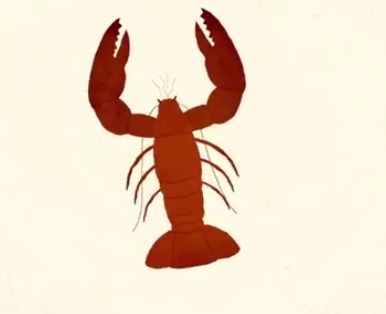Bugs can be eaten whole to make up a meal or ground into flour, powder, and paste to add to food.
蟲子能夠被整個(gè)食用,或者被研磨成細(xì)粉粗粉和糊狀來加在食物里。
But it's not all about taste. They're also healthy.
蟲子不只是好吃,而且還營養(yǎng)。
In fact, scientists say entomophagy could be a cost-effective solution for developing countries that are food insecure.
事實(shí)上,科學(xué)家認(rèn)為食蟲性對(duì)那些食物沒有保障的發(fā)展中國家來說能夠變成一個(gè)省錢的有效途徑。
Insects can contain up to 80% protein, the body's vital building blocks, and are also high in energy-rich fat, fiber, and micronutrients like vitamins and minerals.
因?yàn)橄x子含有80%的蛋白質(zhì),蛋白質(zhì)是身體的頭等重要物質(zhì),蟲子還富含高能量脂肪纖維和微量元素,例如維他命和礦物質(zhì)。
Did you know that most edible insects contain the same amount or even more mineral iron than beef, making them a huge, untapped resource when you consider that iron deficiency is currently the most common nutritional problem in the world?
你知道嗎?大部分可使用的蟲子身體內(nèi)含有和牛肉相同甚至更高的鐵元素,使得蟲子成為了儲(chǔ)量巨大、未經(jīng)開發(fā)的資源,尤其是缺鐵是現(xiàn)在世界上最常見的營養(yǎng)難題。

The mealworm is another nutritious example.
另一個(gè)有營養(yǎng)的例子是黃粉蟲。
The yellow beetle larvae are native to America and easy to farm.
這個(gè)黃色的甲蟲幼蟲源自于美國且容易飼養(yǎng)。
They have a high vitamin content, loads of healthy minerals, and can contain up to 50% protein, almost as much as in an equivalent amount of beef.
它含有很高的維他命成分大量礦物質(zhì),還包含了高達(dá)50%的蛋白質(zhì),基本和牛肉里蛋白質(zhì)的含量是等量的。
To cook, simply sauté in butter and salt or roast and drizzle with chocolate for a crunchy snack.
就烹飪方法來說,簡單地用黃油和鹽來炒,或者烤了沾點(diǎn)巧克力就可以做成很酥軟的點(diǎn)心。
What you have to overcome in "ick factor," you gain in nutrition and taste.
這樣看來,你為什么還要感到“惡心”呢?你不但補(bǔ)充營養(yǎng)還享受到了美味。
Indeed, bugs can be delicious.
蟲子的確是種舌尖上的美味。
Mealworms taste like roasted nuts. Locusts are similar to shrimp.
黃粉蟲味道像堅(jiān)果。蝗蟲像蝦。
Crickets, some people say, have an aroma of popcorn.
對(duì)于蟋蟀,有些人認(rèn)為它有爆米花的芳香。
Farming insects for food also has less environmental impact than livestock farms do because insects emit far less greenhouse gas and use up less space, water, and food.
大量飼養(yǎng)可食用的蟲子比牲畜對(duì)環(huán)境的影響要小得多,因?yàn)橄x子釋放更少的溫室氣體,使用更少的空間,水,還有食物。
Socioeconomically, bug production could uplift people in developing countries since insect farms can be small scale, highly productive, and yet relatively inexpensive to keep.
對(duì)于社會(huì)經(jīng)濟(jì)來說,蟲子的生產(chǎn)能提高發(fā)展中國家人們的生活質(zhì)量,因?yàn)橄x子養(yǎng)殖是小規(guī)模高產(chǎn)量,且相對(duì)來說管理費(fèi)用低廉。
Insects can also be turned into more sustainable food for livestock and can be reared on organic waste, like vegetable peelings, that might otherwise just end up rotting in landfills.
蟲子能夠成為對(duì)牲畜來說更環(huán)保的食物,而且能夠用有機(jī)廢物飼養(yǎng),像是蔬菜的皮,不然蔬菜皮只能爛在地里。
Feeling hungry yet?
感覺到餓了嗎?
Faced with a plate of fried crickets, most people today would still recoil, imagining all those legs and feelers getting stuck between their teeth.
面對(duì)一盤炸蟋蟀的時(shí)候,一想到那些蟲子的腿和觸角會(huì)卡在他們的牙齒里,大部分人還是會(huì)退縮。
But think of a lobster.
但是你想想龍蝦。
It's pretty much just a giant insect with legs and feelers galore that was once regarded as an inferior, repulsive food.
它其實(shí)就像個(gè)大蟲子,也有腿和觸角,它也曾經(jīng)被認(rèn)為是不好的,令人生厭的食物。
Now, lobster is a delicacy.
而現(xiàn)在,龍蝦是一道大餐。
Can the same paradigm shift happen for bugs?
這個(gè)故事也適用于蟲子嗎?
So, give it a try! Pop that insect into your mouth, and savor the crunch.
所以,試試吧!把蟲子扔進(jìn)嘴里,享受蟲子的酥脆吧!



